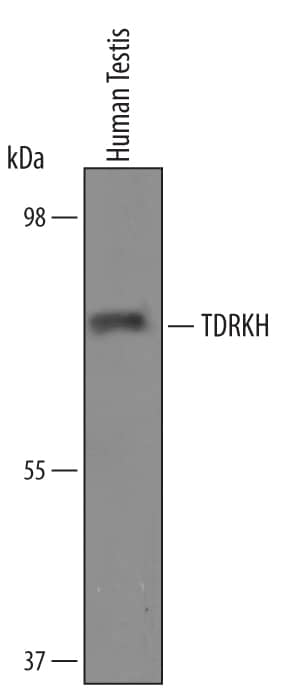Human TDRKH Antibody Summary
His206-Leu561
Accession # Q9Y2W6
Applications
Please Note: Optimal dilutions should be determined by each laboratory for each application. General Protocols are available in the Technical Information section on our website.
Scientific Data
 View Larger
View Larger
Detection of Human TDRKH by Western Blot. Western blot shows lysates of human testis tissue. PVDF Membrane was probed with 1 µg/mL of Human TDRKH Antigen Affinity-purified Polyclonal Antibody (Catalog # AF6286) followed by HRP-conjugated Anti-Sheep IgG Secondary Antibody (Catalog # HAF016). A specific band was detected for TDRKH at approximately 70 kDa (as indicated). This experiment was conducted under reducing conditions and using Immunoblot Buffer Group 8.
 View Larger
View Larger
TDRKH in Mouse Testis. TDRKH was detected in immersion fixed frozen sections of adult mouse testis using Human TDRKH Affinity-purified Polyclonal Antibody (Catalog # AF6286) at 10 µg/mL overnight at 4 °C. Tissue was stained using the NorthernLights™ 493-conjugated Anti-Sheep IgG Secondary Antibody (green; Catalog # NL012) and counterstained with DAPI (blue). Specific staining was localized to germ cells. View our protocol for Fluorescent IHC Staining of Frozen Tissue Sections.
Reconstitution Calculator
Preparation and Storage
- 12 months from date of receipt, -20 to -70 °C as supplied.
- 1 month, 2 to 8 °C under sterile conditions after reconstitution.
- 6 months, -20 to -70 °C under sterile conditions after reconstitution.
Background: TDRKH
TDRKH (Tudor domain and KH domain containing protein; also TDRD2) is a 70 kDa member of the Tudor family of proteins. It is expressed in developing spermatogonia and meiotic primary spermatocytes, but not embryonic stem cells. TDRKH forms part of an RNA-silencing complex that safeguards the germ cell genome. Through its 60 amino acid (aa) Tudor domain, it binds methylated PIWI (P-element-induced wimpy testis) protein and serves to position PIWI for non-coding RNA binding. Human TDRKH is 606 aa in length. It contains two RNA recognition KH domains (aa 52-115 and 124-190), and one methyl-binding Tudor domain (aa 353-412). There are four potential splice forms. Three possess a shared deletion of aa 562-606, with two of these also showing a unique deletion of aa 108-152 and 76-79, respectively; a fourth shows a two aa substitution for aa 559-606. Over aa 206-561, human TDRKH shares 87% aa identity with mouse TDRKH.
Product Datasheets
FAQs
No product specific FAQs exist for this product, however you may
View all Antibody FAQsReviews for Human TDRKH Antibody
There are currently no reviews for this product. Be the first to review Human TDRKH Antibody and earn rewards!
Have you used Human TDRKH Antibody?
Submit a review and receive an Amazon gift card.
$25/€18/£15/$25CAN/¥75 Yuan/¥2500 Yen for a review with an image
$10/€7/£6/$10 CAD/¥70 Yuan/¥1110 Yen for a review without an image

